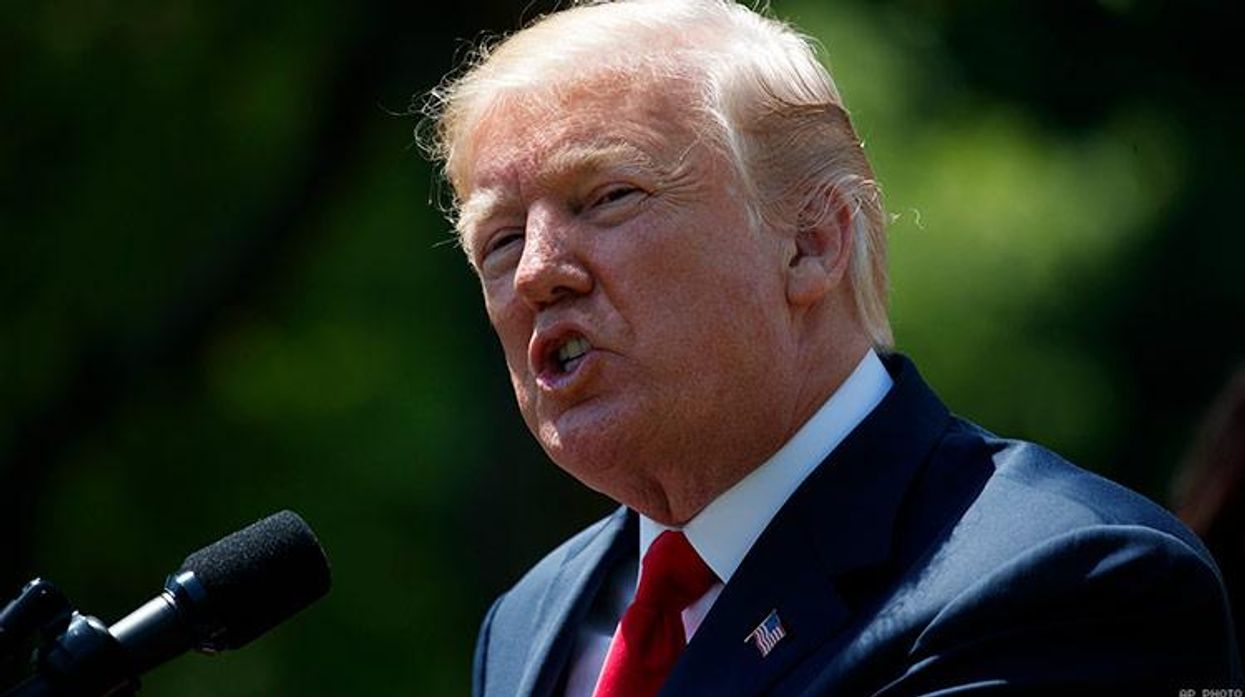Politics
Trump Offers Yet Another 'License to Discriminate' Order

On the National Day of Prayer, he establishes a new faith-based initiative that's bound to be bad news for LGBT people.
May 03 2018 4:07 PM EST
trudestress
By continuing to use our site, you agree to our Privacy Policy and Terms of Use.

On the National Day of Prayer, he establishes a new faith-based initiative that's bound to be bad news for LGBT people.
Donald Trump today marked the National Day of Prayer by issuing yet another executive order to ostensibly protect religious liberty - at least the far-right definition of religious liberty, which is likely to result in anti-LGBT discrimination.
The order establishes the White House Faith and Opportunity Initiative, which Trump said would guard religious freedom and assure that "the faith-based and community organizations that form the bedrock of our society have strong advocates in the White House and throughout the federal government," CBS News reports.
The initiative, to be led by a yet-to-be-named White House adviser, will "provide recommendations on the Administration's policy agenda affecting faith-based and community programs; provide recommendations on programs and policies where faith-based and community organizations may partner and/or deliver more effective solutions to poverty; apprise the Administration of any failures of the executive branch to comply with religious liberty protections under law; and reduce the burdens on the exercise of free religion," according to a White House press release.
The initiative will "help ensure that faith-based organizations have equal access to government funding and equal right to exercise their deeply held beliefs," Trump said at the White House Rose Garden ceremony this morning, CBS reports. This could perhaps mean that religious groups could evade antidiscrimination law and continue to hold government contracts even if they demonstrate bias against LGBT people, members of other faiths, or any other group.
Activists for LGBT rights and civil liberties in general fear the initiative is yet another means for the Trump administration to encourage discrimination. "We're very concerned because this administration has a pattern of inviting discrimination in the name of religion," Camilla Taylor, director of constitutional litigation for Lambda Legal, told The Daily Beast.
Lambda Legal later tweeted, "Freedom of religion is absolutely a core value of our nation. What we're concerned about is the weaponization of that right. Weaponization that allows for and encourages discrimination and harm. Religious freedom is NOT freedom to discriminate."
Daniel Mach, director of the American Civil Liberties Union Program on Freedom of Religion and Belief, released this statement: "Freedom of religion is one of our most fundamental and cherished rights. But that freedom does not give any of us the right to harm other people, to impose our beliefs on others, or to discriminate. The ACLU will be watching this initiative closely to ensure that it does not promote policies that violate these core principles. Many in the U.S., including people of faith, don't want to give taxpayer-funded agencies or businesses open to the public a license to discriminate."
This isn't the administration's first move toward allowing discrimination. On the 2017 National Day of Prayer, 364 days ago, Trump issued an executive order aimed at lessening the effect of the Johnson Amendment, which threatens the tax-exempt status of any church that endorses political candidates or makes campaign contributions. He was expected to issue a "license to discriminate" order at that time, but instead directed the Department of Justice to prepare guidelines on how the administration should approach religious liberty matters. When those came out in October, they created a broad license to discriminate for federal agencies, grantees, and contractors.
The in January, the Department of Health and Human Services established a Division of Conscience and Religious Freedom to investigate complaints by health care providers who claim they were forced to participate, even marginally, in procedures that violated their religious beliefs, and unveiled a proposed rule that would broaden religious exemptions for health workers. These moves could lead to denial of care to transgender people, women seeking reproductive health services, patients seeking PrEP, and many others, civil rights groups warned.
Trudy Ring is The Advocate’s senior politics editor and copy chief. She has been a reporter and editor for daily newspapers and LGBTQ+ weeklies/monthlies, trade magazines, and reference books. She is a political junkie who thinks even the wonkiest details are fascinating, and she always loves to see political candidates who are groundbreaking in some way. She enjoys writing about other topics as well, including religion (she’s interested in what people believe and why), literature, theater, and film. Trudy is a proud “old movie weirdo” and loves the Hollywood films of the 1930s and ’40s above all others. Other interests include classic rock music (Bruce Springsteen rules!) and history. Oh, and she was a Jeopardy! contestant back in 1998 and won two games. Not up there with Amy Schneider, but Trudy still takes pride in this achievement.
Trudy Ring is The Advocate’s senior politics editor and copy chief. She has been a reporter and editor for daily newspapers and LGBTQ+ weeklies/monthlies, trade magazines, and reference books. She is a political junkie who thinks even the wonkiest details are fascinating, and she always loves to see political candidates who are groundbreaking in some way. She enjoys writing about other topics as well, including religion (she’s interested in what people believe and why), literature, theater, and film. Trudy is a proud “old movie weirdo” and loves the Hollywood films of the 1930s and ’40s above all others. Other interests include classic rock music (Bruce Springsteen rules!) and history. Oh, and she was a Jeopardy! contestant back in 1998 and won two games. Not up there with Amy Schneider, but Trudy still takes pride in this achievement.
Charlie Kirk DID say stoning gay people was the 'perfect law' — and these other heinous quotes